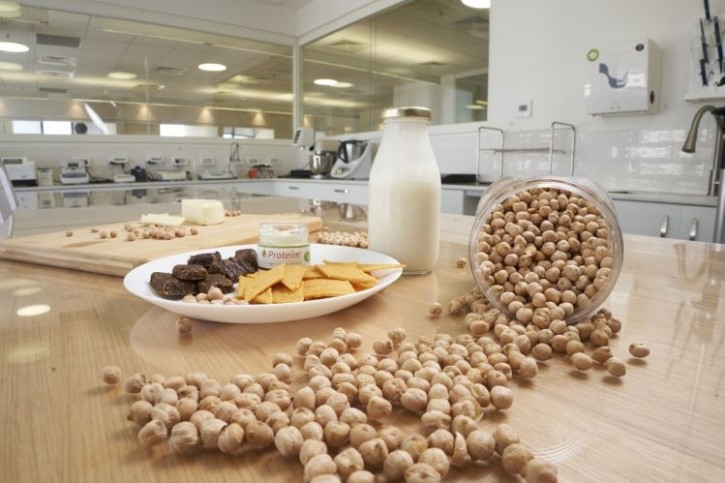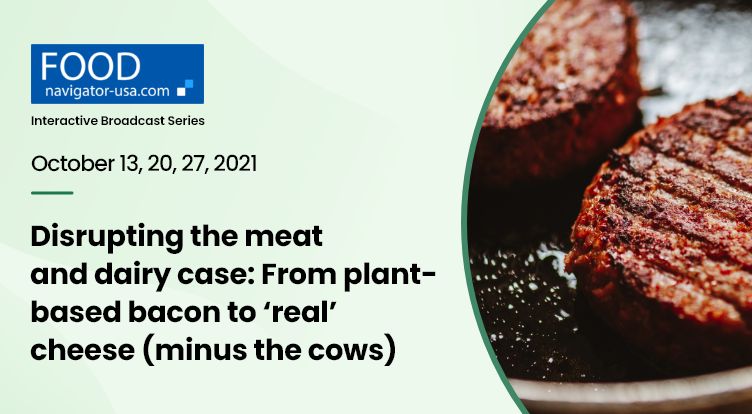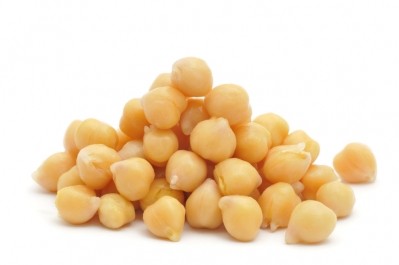InnovoPro expands meat alternative toolbox with textured chickpea protein launch

The TVP – billed as non-GMO, gluten-free, soy-free, and non-allergenic – will debut at the SupplySide West trade show in Las Vegas later this month (booth #2417) and will be made using chickpeas sourced from American farmers in collaboration with Cereal Ingredients Inc, CEO Taly Nechushtan told FoodNavigator-USA.
While Virginia-based Nutriati has blended chickpea flour with pea proteins to make TVP, InnovoPro is combining chickpea protein concentrate and pea protein concentrate and putting them through an extrusion process to create a more functional, better-tasting meat alternative, said Nechushtan.
“We wanted to find a variety of proteins that will be non-allergenic and non-GMO with a very neutral taste, no smell, and the right amino acid profile, and so we tried several options and the best-performing combination was chickpea and pea.
“I think that the most unique aspect of our TVP [which is produced via low-moisture extrusion, dried, and sold as a shelf-stable ingredient] is that you don't get any off notes or after tastes or smells.”
She added: “We’ve shared samples with trusted partners and experts in meat analogs and they tested it in their application labs and their results were amazing. When they compared nuggets and burgers made with this versus what’s already in the market, people significantly favored the products made with our TVP.”
Chickpea protein concentrate
The TVP is the second product from InnovoPro, which launched a 70% chickpea protein concentrate in 2019 that now features in a wide range of products from yogurts to ice creams and barista-style plant-based milks (products available in the US include Simply Free plant-based beverages and plant-based eggs from Zero Egg), said Nechushtan.
“At the beginning of 2022 there will be several huge launches in the dairy alternatives space using our chickpea protein concentrate.”
While milled chickpea powders and flours have been on the market for some time, only a handful of companies have developed techniques to produce functional protein concentrates and isolates – including InnovoPro and fellow Israeli firm ChickP and Virginia, US-based Nutriati - which have developed techniques to remove key anti-nutritionals and preserve the qualities of the protein that make it attractive to formulators.
They all use different extraction methods - and Nechushtan is careful not to comment on the relative merits of the products or processes, although she notes that InnovoPro's process – developed by founder Dr Ascher Shmulewitz - doesn’t use organic solvents such as ethanol.
“Chickpea has a combination of properties that you cannot find today in other plant proteins. Functionality, taste, nutrition, digestibility, and a clean-label, so we think the market opportunity is huge,” she told us in a recent interview.
“The pace of growth in plant-based products is something we haven’t seen in the food business for many years; I started my career in food and when we were growing at 3% a year we were really happy.”
Functionality and performance
From a functional perspective, InnovoPro’s 70% chickpea protein concentrate is a “strong emulsifier that combines water and oil together, which is what all R&D managers are looking for; but they are also looking for a very soluble protein, especially for beverages,” said Nechushtan, who took the helm at InnovoPro in 2016.
She noted for example that it performs well in low pH beverages, in which plant-based proteins such as pea can sometimes precipitate out of solution, or are not able to solubilize. “Plant protein in general are very sensitive to pH and you can get flakes of the product floating around in coffee for example, but we can prevent this.”
Protein digestibility and nutrition
While chickpeas are not a source of complete protein like soy, egg, or casein, InnovoPro’s protein is a high-quality concentrated protein source with a PDCAAS of 0.8 – at the top end of the scale for plant-proteins, said Nechushtan.
As for the other 30% of the protein concentrate that isn’t protein, she said, “Food companies are also looking for healthy fibers, so it’s highly nutritious, and low in carbs and sodium.”
Neutral taste, creamy texture, clean label
From a sensory perspective, InnovoPro’s chickpea protein concentrate is neutral-tasting with a smooth creamy mouthfeel (no ‘beany’ or ‘earthy’ taste or grittiness), which makes it very attractive for manufacturers of products such as plant-based milks, said Nechushtan.
You can also incorporate a meaningful amount of it in applications such as plant-based milks before taste becomes an issue, she said. “You can get to at least 3% of protein in a product which is similar to [dairy] milk [which contains around 3.3% protein] without a beany taste.”
“So now we get onto the clean label aspect,” she said. “Because it doesn’t have these off notes, it doesn’t need masking agents, plus in some applications you can also cut out the use of gums and modified starches [which many formulators don’t want to use if they can help it, she claimed].
Examples include vegan ice cream without lecithin, guar gum, carrageenan or starch; non-dairy desserts without modified starch, carrageenan, pectin and maltodextrin; egg-free mayo minus the modified starch, and dairy-free cheeses, where the chickpea protein has an attractive color but also stretches when it is heated.
Consumer-friendly: 'Everybody knows chickpeas'
More generally, she said, chickpea protein – which is non-GMO and non-allergenic - has broad consumer appeal. Put another way, you don’t need to educate consumers about chickpeas, which are widely used in traditional foods from hummus to tahini, but are also appearing in a new generation of products from pasta (Banza) to extruded snacks (Hippeas): “Consumers trust chickpeas, they’re widely consumed throughout the world. Everybody knows chickpeas.”
Based in Raanana, Israel, with offices in Chicago and California, InnovoPro was founded in 2013 by Dr Ascher Shmulewitz, an inventor with scores of patents to his name.
To date, it has raised $23m, most recently completing a Series B round led by Jerusalem Venture Partners (JVP), and supported by Rabo Food & Agri Innovation Fund, part of Rabobank’s investment arm Rabo Corporate Investments, leading Israeli VC fund ICOS Capital, and early-stage investment platform iAngels. Swiss retailer Migros is a customer but also a shareholder.
InnovoPro's first products are chickpea protein concentrates and a TVP combining chickpea and pea protein. However, it is exploring additional products including chickpea starch, an organic protein concentrate, and further down the road, chickpea protein isolates.
Interested in meat, dairy, and seafood alternatives?
Checkout FoodNavigator-USA's FREE 'Disrupting the Meat and Dairy Case' 3-part series:
Oct 13 (10am PT/1pm ET): Where next for meat alternatives? From plant-based burgers to fungi-fueled bacon - featuring Kroger, Atlast Food Co, Nature's Fynd, Nowadays, Oterra, and Roquette
Oct 20(10am PT/1pm ET): Where next for dairy alternatives? From oatmilk to ‘real’ cheese (minus the cows) - featuring Danone, NotCo, BioMilk, Change Foods, RSSL, and CP Kelco
Oct 27(10am PT/1pm ET): Where next for seafood alternatives? From tuna to shrimp - featuring the Good Food Institute, Good Catch, Ocean Hugger, New Wave Foods, and Aqua Cultured Foods.


















